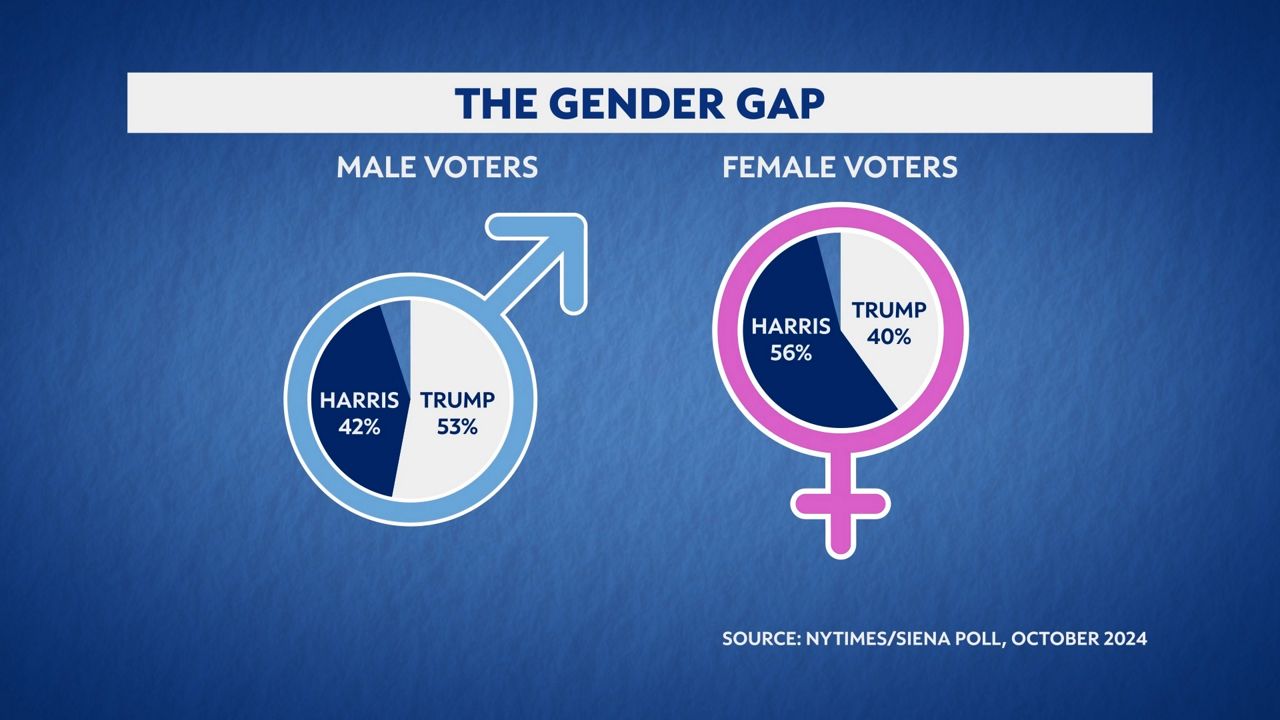From childless cat ladies to the masculinity crisis, the gender gap is widening during this year’s presidential election. We spoke with experts to get an in-depth look at how gender drives votes and what the candidates are doing to capitalize on that factor.
What You Need To Know
- Gender has become an important topic in the 2024 presidential election
- Polls show a widening gender gap among voters
- Experts explain how electability bias affects female candidates
Speaking to a crowd of his supporters in August, former president Donald Trump mocked Vice President Harris’s laugh.
“Have you heard her laugh? That is the laugh of a crazy person. That is a laugh of a lunatic.”
Harris has repeatedly called her opponent “an unserious man.”
A resurfaced 2021 comment from Trump’s running mate, Ohio Senator JD Vance has led to a series of election-related “childless cat lady” memes.
And a suggestive hand gesture made by former president Barack Obama in conjunction with a comment about Trump’s “weird obsession with crowd sizes” made headlines during the Democratic National Convention.
Former President Donald Trump versus Vice President Kamala Harris. Republican versus Democrat. Man versus woman. The 2024 presidential race is a battle of the sexes... or is it?
“All elections are masculinity contests,” argued Dan Cassino, a politics professor at Fairleigh Dickinson University. “It’s just we often don’t recognize it because it’s two men.”
In our country’s nearly 250-year history, we have only known male presidents.
“We define leadership traits as being masculine traits. So, when we think of masculine traits, masculine personality traits, we’re talking about a genetic behavior, someone who’s going to get stuff done, someone who’s aggressive,” Cassino said.
As candidates and political strategists have zeroed in on this, we see the masculinity contest on full display along the campaign trail.
“He talked about being manly, you know, hand size and things like this, right? Using kind of brute force and strength, saying she doesn’t have the presidential look,” said Kelly Dittmar, a director of research at Rutgers University’s Center for American Women and Politics. “Donald Trump was really leaning into the fact that his masculinity, his manhood, was the primary credential.”
Female candidates, on the other hand, have a distinct challenge.
“Female candidates have to be masculine, have to be a leader, but they can’t be too masculine because then you’d be nonconforming,” said Cassino.
“So female candidates have to somehow be both masculine and feminine at the same time, so they have to run for office, you know, backwards and high heels.”
Dittmar explained that much of the challenge faced by female candidates can be attributed to something called an electability bias.
“The electability bias that women and particularly women of color, have faced in U.S. politics across levels of office, is especially strong at the presidential level. And what that bias is, is a presumption that the country writ large is not ready to elect a woman,” Dittmar said.
It’s something we saw play out in 2016 when Former Secretary of State Hillary Clinton ran with the “I’m with Her” slogan and Trump went on gender-based attacks.
But in the nearly 10 years since, we have seen a shift…a realignment.
“In 2016, there were a lot of sexist male democrats, and they did not like Hillary Clinton. They moved over to Bernie Sanders. And a lot of those Bernie brothers from 2016 are now hardcore Trump supporters,” explained Cassino.
According to a New York Times-Siena College poll out this month, the race could have the largest gender gap since exits polls have been taken—beyond the previous record of eleven percentage points reached in the 1992 and 2016 elections.

Voters in the survey also think that Trump is a stronger leader while Harris is found to be more fun.
One key difference from 2016 is that Harris entered the race much later in the campaign, skipping primaries and experiencing less so-called electability bias.
“It’s especially harmful at that primary stage because during the primary, folks are doing calculations of, I have to choose the candidates most likely to win in November,” said Dittmar. “Donors are doing calculation who’s the most viable candidate against the Republican nominee?”
Perhaps as a result, we see the use of gender playing a very understated role in the Harris campaign. This, as Cassino says, Trump is making inroads with groups who value traditional masculine traits.
“So young Black and Hispanic men are moving over into the Trump campaign because he’s saying, I’m going to fix this. I’m going to give you a way forward. We can meet the demands of masculinity.”
Both Dittmar and Cassino say voters don’t turn out to the polls based on gender alone.
“Scholars have done studies of what motivates your vote on Election Day, it is not gender and it is not race. In other words, you’re motivated almost entirely by party,” Dittmar said.
In the end, whether we come from Venus or from Mars doesn’t really matter. We all end up at the ballot box.
A previous version of this article had misspelled Kelly Dittmar's name



